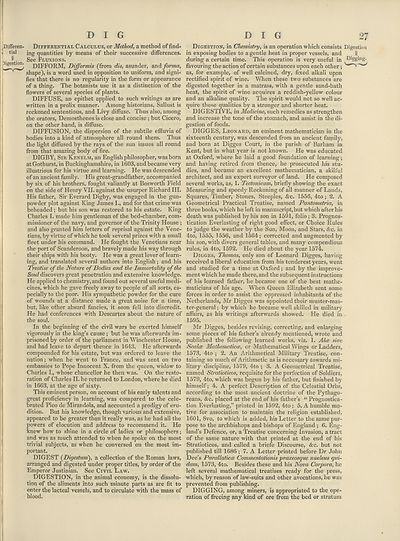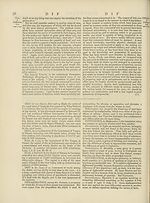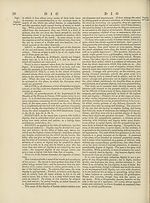Encyclopaedia Britannica > Volume 8, DIA-England
(37) Page 27
Download files
Complete book:
Individual page:
Thumbnail gallery: Grid view | List view

DIG
Differen- Differential Calculus, or Method, a method of find-
I tml ing quantities by means of their successive differences.
N See Fluxions.
DIFFORM, Difformis (from dis, asunder, and forma,
shape), is a word used in opposition to uniform, and signi¬
fies that there is no regularity in the form or appearance
of a thing. The botanists use it as a distinction of the
flowers of several species of plants.
DIFFUSE, an epithet applied to such writings as are
written in a prolix manner. Among historians, Sallust is
reckoned sententious, and Livy diffuse. Thus also, among
the orators, Demosthenes is close and concise ; but Cicero,
on the other hand, is diffuse.
DIFFUSION, the dispersion of the subtile effluvia of
bodies into a kind of atmosphere all round them. Thus
the light diffused by the rays of the sun issues all round
from that amazing body of fire.
DIGBY, Sir Kenelm, an English philosopher, was born
atGothurst, in Buckinghamshire, in 1603, and became very
illustrious for his virtue and learning. He was descended
of an ancient family. His great-grandfather, accompanied
by six of his brothers, fought valiantly at Bosworth Field
on the side of Henry VII. against the usurper Richard III.
His father, Sir Everard Digby, was engaged in the gun¬
powder plot against King James I., and for that crime was
beheaded; but his son was restored to his estate. King
Charles I. made him gentleman of the bed-chamber, com¬
missioner of the navy, and governor of the Trinity House ;
and also granted him letters of reprisal against the Vene¬
tians, by virtue of which he took several prizes with a small
fleet under his command. He fought the Venetians near
the port of Scanderoon, and bravely made his way through
their ships with his booty. He was a great lover of learn¬
ing, and translated several authors into English; and his
Treatise of the Nature of Bodies and the Immortality of the
Soul discovers great penetration and extensive knowledge.
He applied to chemistry, and found out several useful medi¬
cines, which he gave freely away to people of all sorts, es¬
pecially to the poor. His sympathetic powder for the cure
of wounds at a distance made a great noise for a time,
but, like ofher absurd fancies, it soon fell into discredit.
He had conferences with Descartes about the nature of
the soul.
In the beginning of the civil wars he exerted himself
vigorously in the king’s cause; but he was afterwards im¬
prisoned by order of the parliament in Winchester House,
and had leave to depart thence in 1643. He afterwards
compounded for his estate, but was ordered to leave the
nation; when he went to France, and was sent on two
embassies to Pope Innocent X. from the queen, widow to
Charles I., whose chancellor he then was. On the resto¬
ration of Charles II. he returned to London, where he died
in 1663, at the age of sixty.
This eminent person, on account of his early talents and
great proficiency in learning, was compared to the cele¬
brated Pico de Mirandola, and accounted a prodigy of eru¬
dition. But his knowledge, though various and extensive,
appeared to be greater than it really was, as he had all the
owers of elocution and address to recommend it. He
new how to shine in a circle of ladies or philosophers;
and was as much attended to when he spoke on the most
trivial subjects, as when he conversed on the most im¬
portant.
DIGEST (Digestum), a collection of the Roman laws,
arranged and digested under proper titles, by order of the
Emperor Justinian. See Civil Law.
DIGESTION, in the animal economy, is the dissolu¬
tion of the aliments into such minute parts as are fit to
enter the lacteal vessels, and to circulate with the mass of
blood.
DIG 27
Digestion, in Chemistry, is an operation which consists Digestion
in exposing bodies to a gentle heat in proper vessels, and II
during a certain time. This operation is very useful in digging,
favouring the action of certain substances upon each other;
as, for example, of well calcined, dry, fixed alkali upon
rectified spirit of wine. When these two substances are
digested together in a matrass, with a gentle sand-bath
heat, the spirit of wine acquires a reddish-yellow colour
and an alkaline quality. The spirit would not so well ac¬
quire these qualities by a stronger and shorter heat.
DIGESTIVE, in Medicine, such remedies as strengthen
and increase the tone of the stomach, and assist in the di¬
gestion of foods.
DIGGES, Leonard, an eminent mathematician in the
sixteenth century, was descended from an ancient family,
and born at Digges Court, in the parish of Barham in
Kent, but in what year is not known. He was educated
at Oxford, where he laid a good foundation of learning ;
and having retired from thence, he prosecuted his stu¬
dies, and became an excellent mathematician, a skilful
architect, and an expert surveyor of land. He composed
several works, as, 1. Tectonicum, briefly showing the exact
Measuring and speedy Reckoning of all manner of Lands,
Squares, Timber, Stones, Steeples, &c. 1556, 4to; 2. A
Geometrical Practical Treatise, named Pantometria, in
three books, which he left in manuscript, but which after his
death was published by his son in 1591, folio; 3. Prognos¬
tication Everlasting of right good effect, or Choice Rules
to judge the weather by the Sun, Moon, and Stars, &c. in
4to, 1555, 1556, and 1564; corrected and augmented by
his son, with divers general tables, and many compendious
rules, in 4to, 1592. He died about the year 1574.
Digges, Thomas, only son of Leonard Digges, having
received a liberal education from his tenderest years, went
and studied for a time at Oxford; and by the improve¬
ment which he made there, and the subsequent instructions
of his learned father, he became one of the best mathe¬
maticians of his age. When Queen Elizabeth sent some
forces in order to assist the oppressed inhabitants of the
Netherlands, Mr Digges was appointed their muster-mas¬
ter-general ; by which he became well skilled in military
affairs, as his writings afterwards showed. He died in
1595.
Mr Digges, besides revising, correcting, and enlarging
some pieces of his father’s already mentioned, wrote and
published the following learned works, viz. 1. Alee sive
Scales Mathematicce, or Mathematical Wings or Ladders,
1573, 4to ; 2. An Arithmetical Military Treatise, con¬
taining so much of Arithmetic as is necessary towards mi¬
litary discipline, 1579, 4to ; 3. A Geometrical Treatise,
named Stratioticos, requisite for the perfection of Soldiers,
1579, 4to, which was begun by his father, but finished by
himself; 4. A perfect Description of the Celestial Orbs,
according to the most ancient doctrine of the Pythago¬
reans, &c. placed at the end of his father’s “ Prognostica¬
tion Everlasting,” printed in 1592, 4to ; 5. A humble mo¬
tive for association to maintain the religion established,
1601, 8vo, to which is added, his Letter to the same pur¬
pose to the archbishops and bishops of England ; 6. Eng¬
land’s Defence, or, a Treatise concerning Invasion, a tract
of the same nature with that printed at the end of his
Stratioticos, and called a briefe Discourse, &c. but not
published till 1686; 7. A Letter printed before Dr John
Dee’s Parallaticce Commentationis praxeosque nucleus qvi~
dam, 1573, 4to. Besides these and his Nava Corpora, he
left several mathematical treatises ready for the press,
which, by reason of law-suits and other avocations, he was
prevented from publishing.
DIGGING, among miners, is appropriated to the ope¬
ration of freeing any kind of ore from the bed or stratum
Differen- Differential Calculus, or Method, a method of find-
I tml ing quantities by means of their successive differences.
N See Fluxions.
DIFFORM, Difformis (from dis, asunder, and forma,
shape), is a word used in opposition to uniform, and signi¬
fies that there is no regularity in the form or appearance
of a thing. The botanists use it as a distinction of the
flowers of several species of plants.
DIFFUSE, an epithet applied to such writings as are
written in a prolix manner. Among historians, Sallust is
reckoned sententious, and Livy diffuse. Thus also, among
the orators, Demosthenes is close and concise ; but Cicero,
on the other hand, is diffuse.
DIFFUSION, the dispersion of the subtile effluvia of
bodies into a kind of atmosphere all round them. Thus
the light diffused by the rays of the sun issues all round
from that amazing body of fire.
DIGBY, Sir Kenelm, an English philosopher, was born
atGothurst, in Buckinghamshire, in 1603, and became very
illustrious for his virtue and learning. He was descended
of an ancient family. His great-grandfather, accompanied
by six of his brothers, fought valiantly at Bosworth Field
on the side of Henry VII. against the usurper Richard III.
His father, Sir Everard Digby, was engaged in the gun¬
powder plot against King James I., and for that crime was
beheaded; but his son was restored to his estate. King
Charles I. made him gentleman of the bed-chamber, com¬
missioner of the navy, and governor of the Trinity House ;
and also granted him letters of reprisal against the Vene¬
tians, by virtue of which he took several prizes with a small
fleet under his command. He fought the Venetians near
the port of Scanderoon, and bravely made his way through
their ships with his booty. He was a great lover of learn¬
ing, and translated several authors into English; and his
Treatise of the Nature of Bodies and the Immortality of the
Soul discovers great penetration and extensive knowledge.
He applied to chemistry, and found out several useful medi¬
cines, which he gave freely away to people of all sorts, es¬
pecially to the poor. His sympathetic powder for the cure
of wounds at a distance made a great noise for a time,
but, like ofher absurd fancies, it soon fell into discredit.
He had conferences with Descartes about the nature of
the soul.
In the beginning of the civil wars he exerted himself
vigorously in the king’s cause; but he was afterwards im¬
prisoned by order of the parliament in Winchester House,
and had leave to depart thence in 1643. He afterwards
compounded for his estate, but was ordered to leave the
nation; when he went to France, and was sent on two
embassies to Pope Innocent X. from the queen, widow to
Charles I., whose chancellor he then was. On the resto¬
ration of Charles II. he returned to London, where he died
in 1663, at the age of sixty.
This eminent person, on account of his early talents and
great proficiency in learning, was compared to the cele¬
brated Pico de Mirandola, and accounted a prodigy of eru¬
dition. But his knowledge, though various and extensive,
appeared to be greater than it really was, as he had all the
owers of elocution and address to recommend it. He
new how to shine in a circle of ladies or philosophers;
and was as much attended to when he spoke on the most
trivial subjects, as when he conversed on the most im¬
portant.
DIGEST (Digestum), a collection of the Roman laws,
arranged and digested under proper titles, by order of the
Emperor Justinian. See Civil Law.
DIGESTION, in the animal economy, is the dissolu¬
tion of the aliments into such minute parts as are fit to
enter the lacteal vessels, and to circulate with the mass of
blood.
DIG 27
Digestion, in Chemistry, is an operation which consists Digestion
in exposing bodies to a gentle heat in proper vessels, and II
during a certain time. This operation is very useful in digging,
favouring the action of certain substances upon each other;
as, for example, of well calcined, dry, fixed alkali upon
rectified spirit of wine. When these two substances are
digested together in a matrass, with a gentle sand-bath
heat, the spirit of wine acquires a reddish-yellow colour
and an alkaline quality. The spirit would not so well ac¬
quire these qualities by a stronger and shorter heat.
DIGESTIVE, in Medicine, such remedies as strengthen
and increase the tone of the stomach, and assist in the di¬
gestion of foods.
DIGGES, Leonard, an eminent mathematician in the
sixteenth century, was descended from an ancient family,
and born at Digges Court, in the parish of Barham in
Kent, but in what year is not known. He was educated
at Oxford, where he laid a good foundation of learning ;
and having retired from thence, he prosecuted his stu¬
dies, and became an excellent mathematician, a skilful
architect, and an expert surveyor of land. He composed
several works, as, 1. Tectonicum, briefly showing the exact
Measuring and speedy Reckoning of all manner of Lands,
Squares, Timber, Stones, Steeples, &c. 1556, 4to; 2. A
Geometrical Practical Treatise, named Pantometria, in
three books, which he left in manuscript, but which after his
death was published by his son in 1591, folio; 3. Prognos¬
tication Everlasting of right good effect, or Choice Rules
to judge the weather by the Sun, Moon, and Stars, &c. in
4to, 1555, 1556, and 1564; corrected and augmented by
his son, with divers general tables, and many compendious
rules, in 4to, 1592. He died about the year 1574.
Digges, Thomas, only son of Leonard Digges, having
received a liberal education from his tenderest years, went
and studied for a time at Oxford; and by the improve¬
ment which he made there, and the subsequent instructions
of his learned father, he became one of the best mathe¬
maticians of his age. When Queen Elizabeth sent some
forces in order to assist the oppressed inhabitants of the
Netherlands, Mr Digges was appointed their muster-mas¬
ter-general ; by which he became well skilled in military
affairs, as his writings afterwards showed. He died in
1595.
Mr Digges, besides revising, correcting, and enlarging
some pieces of his father’s already mentioned, wrote and
published the following learned works, viz. 1. Alee sive
Scales Mathematicce, or Mathematical Wings or Ladders,
1573, 4to ; 2. An Arithmetical Military Treatise, con¬
taining so much of Arithmetic as is necessary towards mi¬
litary discipline, 1579, 4to ; 3. A Geometrical Treatise,
named Stratioticos, requisite for the perfection of Soldiers,
1579, 4to, which was begun by his father, but finished by
himself; 4. A perfect Description of the Celestial Orbs,
according to the most ancient doctrine of the Pythago¬
reans, &c. placed at the end of his father’s “ Prognostica¬
tion Everlasting,” printed in 1592, 4to ; 5. A humble mo¬
tive for association to maintain the religion established,
1601, 8vo, to which is added, his Letter to the same pur¬
pose to the archbishops and bishops of England ; 6. Eng¬
land’s Defence, or, a Treatise concerning Invasion, a tract
of the same nature with that printed at the end of his
Stratioticos, and called a briefe Discourse, &c. but not
published till 1686; 7. A Letter printed before Dr John
Dee’s Parallaticce Commentationis praxeosque nucleus qvi~
dam, 1573, 4to. Besides these and his Nava Corpora, he
left several mathematical treatises ready for the press,
which, by reason of law-suits and other avocations, he was
prevented from publishing.
DIGGING, among miners, is appropriated to the ope¬
ration of freeing any kind of ore from the bed or stratum
Set display mode to:
![]() Universal Viewer |
Universal Viewer | ![]() Mirador |
Large image | Transcription
Mirador |
Large image | Transcription
Images and transcriptions on this page, including medium image downloads, may be used under the Creative Commons Attribution 4.0 International Licence unless otherwise stated. ![]()
| Encyclopaedia Britannica > Encyclopaedia Britannica > Volume 8, DIA-England > (37) Page 27 |
|---|
| Permanent URL | https://digital.nls.uk/193323486 |
|---|
| Attribution and copyright: |
|
|---|
| Description | Ten editions of 'Encyclopaedia Britannica', issued from 1768-1903, in 231 volumes. Originally issued in 100 weekly parts (3 volumes) between 1768 and 1771 by publishers: Colin Macfarquhar and Andrew Bell (Edinburgh); editor: William Smellie: engraver: Andrew Bell. Expanded editions in the 19th century featured more volumes and contributions from leading experts in their fields. Managed and published in Edinburgh up to the 9th edition (25 volumes, from 1875-1889); the 10th edition (1902-1903) re-issued the 9th edition, with 11 supplementary volumes. |
|---|---|
| Additional NLS resources: |
|

